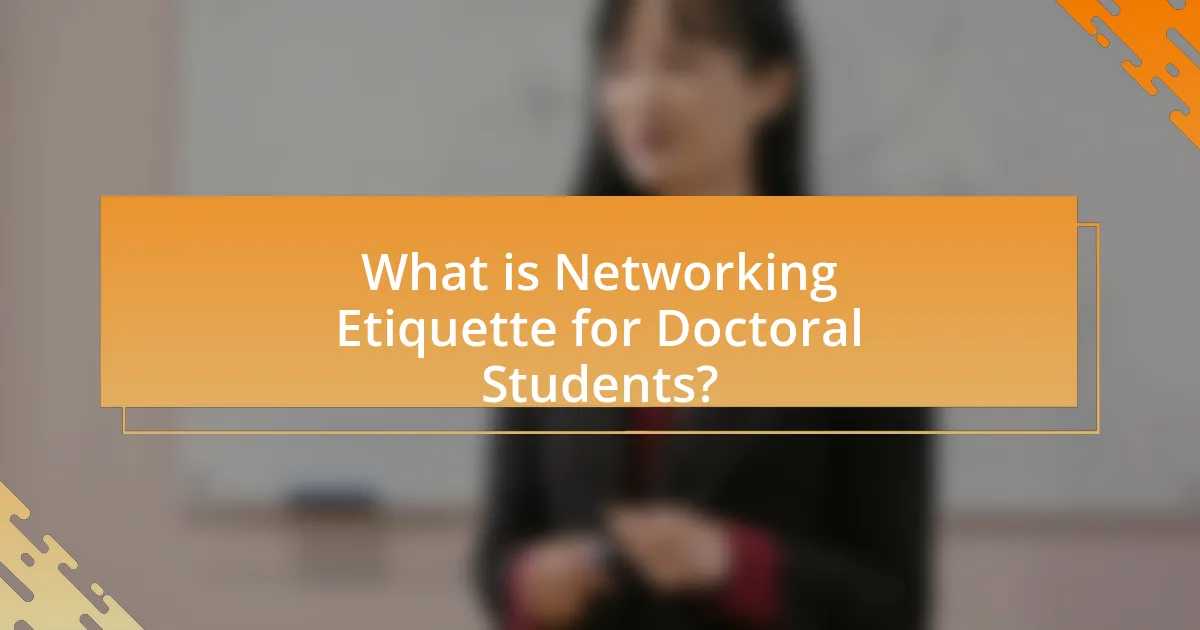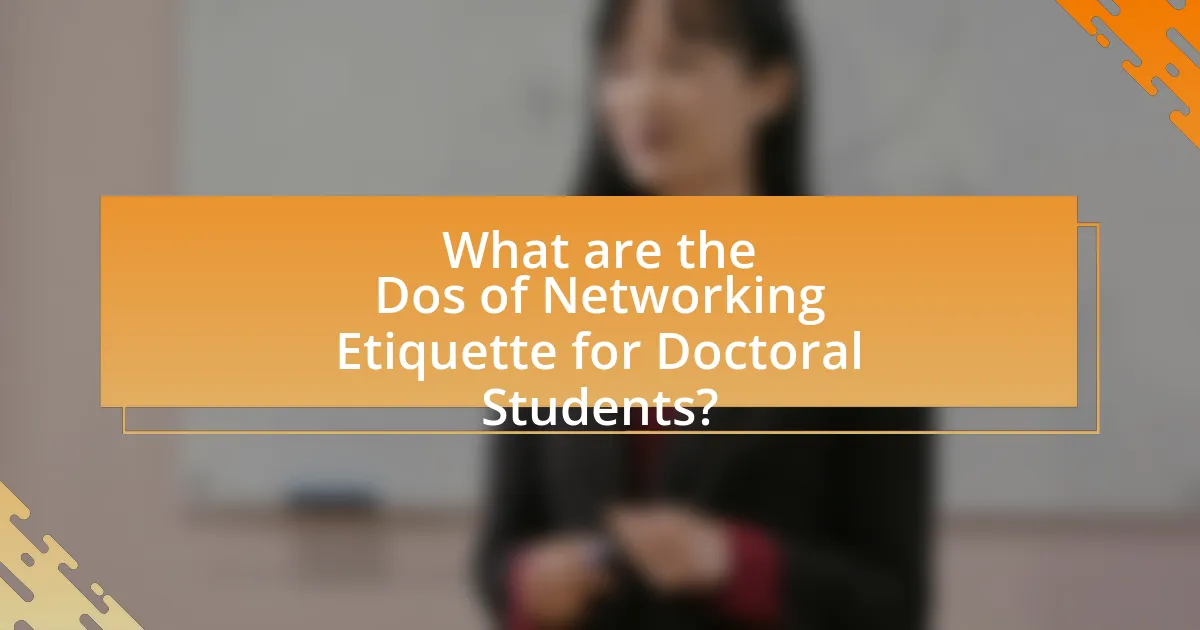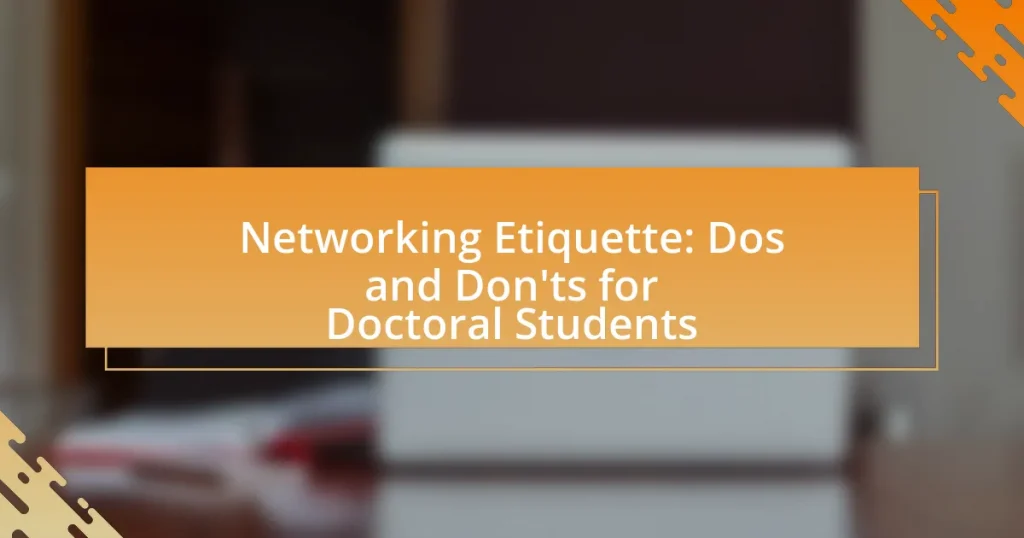Networking etiquette for doctoral students is essential for fostering professional relationships and enhancing career opportunities. This article outlines the key principles of effective networking, including professionalism, respect, and clear communication. It emphasizes the importance of being prepared, engaging meaningfully, and following up after networking events. Additionally, it discusses common networking scenarios, the impact of body language, and the significance of maintaining a professional online presence. The article also highlights the dos and don’ts of networking etiquette, providing practical tips for doctoral students to build and sustain valuable connections in academia and industry.

What is Networking Etiquette for Doctoral Students?
Networking etiquette for doctoral students involves maintaining professionalism, being respectful, and fostering genuine connections. Doctoral students should introduce themselves clearly, express interest in others’ work, and follow up with personalized messages after meetings or events. Additionally, they should be mindful of their online presence, ensuring that social media profiles reflect their academic and professional aspirations. According to a study published in the Journal of Higher Education, effective networking can significantly enhance career opportunities for doctoral candidates, highlighting the importance of these etiquette practices in building valuable relationships within academia and industry.
Why is Networking Important for Doctoral Students?
Networking is important for doctoral students because it facilitates access to academic resources, mentorship, and career opportunities. Establishing connections with peers, faculty, and industry professionals can lead to collaborations that enhance research quality and visibility. According to a study published in the “Journal of Higher Education,” 70% of jobs are found through networking, highlighting its critical role in career advancement. Additionally, networking helps doctoral students stay informed about trends in their field, which can influence their research direction and professional development.
How can networking impact a doctoral student’s career?
Networking significantly impacts a doctoral student’s career by providing access to opportunities, resources, and professional connections that can enhance their academic and career prospects. Engaging with peers, faculty, and industry professionals allows doctoral students to gain insights into their field, discover job openings, and receive mentorship. Research indicates that approximately 70% of jobs are found through networking, highlighting its importance in career advancement. Additionally, networking can lead to collaborations on research projects, which can enhance a student’s publication record and visibility in their academic community.
What are the long-term benefits of effective networking?
Effective networking leads to long-term benefits such as enhanced career opportunities, access to valuable resources, and the establishment of lasting professional relationships. These benefits arise because networking allows individuals to connect with industry leaders and peers, which can result in job referrals, mentorship, and collaboration on projects. Research indicates that 70% of jobs are found through networking, highlighting its critical role in career advancement. Additionally, a strong network can provide ongoing support and knowledge sharing, which is essential for professional growth and adaptation in a rapidly changing job market.
What are the Key Principles of Networking Etiquette?
The key principles of networking etiquette include professionalism, respect, and effective communication. Professionalism involves presenting oneself appropriately and being punctual for meetings or events, which establishes credibility. Respect is shown by valuing others’ time and opinions, actively listening, and being courteous in interactions. Effective communication encompasses clear and concise messaging, as well as following up after meetings to express gratitude and reinforce connections. These principles are essential for building and maintaining professional relationships in academic and professional settings.
How should doctoral students introduce themselves in networking situations?
Doctoral students should introduce themselves in networking situations by clearly stating their name, academic program, and research focus. This structured introduction allows for immediate recognition and relevance in academic circles. For example, a doctoral student might say, “Hello, my name is Jane Smith, and I am a PhD candidate in Environmental Science focusing on sustainable urban development.” This approach not only provides essential information but also invites further conversation about shared interests or potential collaborations. Research indicates that concise and relevant self-introductions enhance networking effectiveness, as they facilitate connections based on common academic pursuits.
What role does body language play in networking etiquette?
Body language plays a crucial role in networking etiquette by conveying confidence, openness, and engagement. Effective body language, such as maintaining eye contact, offering a firm handshake, and using open gestures, helps establish trust and rapport with others. Research indicates that nonverbal communication accounts for approximately 93% of the emotional impact of a message, highlighting its significance in networking contexts. Therefore, mastering body language is essential for doctoral students to create positive impressions and foster meaningful connections in professional settings.
What are Common Networking Scenarios for Doctoral Students?
Common networking scenarios for doctoral students include attending academic conferences, participating in research seminars, engaging in departmental events, and utilizing online platforms like LinkedIn. These scenarios provide opportunities for doctoral students to connect with peers, faculty, and industry professionals, facilitating collaboration and mentorship. For instance, academic conferences often feature networking sessions where students can meet established researchers, leading to potential collaborations or job opportunities. Research seminars allow students to present their work and receive feedback, fostering relationships with faculty and fellow researchers. Engaging in departmental events helps students build a local network within their institution, while online platforms enable broader connections across disciplines and geographical boundaries.
How should doctoral students approach networking at conferences?
Doctoral students should approach networking at conferences by being proactive and prepared. This involves researching attendees and speakers beforehand, preparing an elevator pitch about their research, and engaging in conversations with a genuine interest in others’ work. Studies show that effective networking can lead to collaborative opportunities and career advancements, highlighting the importance of building professional relationships in academia.
What etiquette should be followed during academic networking events?
During academic networking events, attendees should prioritize professionalism and respect. This includes dressing appropriately, maintaining a polite demeanor, and actively listening to others. Engaging in meaningful conversations, asking insightful questions, and showing genuine interest in others’ work fosters a positive networking environment. Additionally, following up with new contacts after the event through email or social media reinforces connections made. Research indicates that effective networking can significantly enhance academic collaboration and career opportunities, highlighting the importance of adhering to these etiquette guidelines.

What are the Dos of Networking Etiquette for Doctoral Students?
The Dos of networking etiquette for doctoral students include being respectful, prepared, and engaging. Doctoral students should always approach networking opportunities with a professional demeanor, showing respect for others’ time and contributions. Preparation involves researching individuals or organizations beforehand to facilitate meaningful conversations. Engaging actively by asking questions and listening attentively fosters connections and demonstrates genuine interest. Additionally, following up with contacts after initial meetings reinforces relationships and shows appreciation for their time. These practices are essential for building a strong professional network in academia and beyond.
How can doctoral students effectively build their network?
Doctoral students can effectively build their network by actively participating in academic conferences and workshops. Engaging in these events allows students to meet peers, faculty, and industry professionals, fostering connections that can lead to collaboration and mentorship opportunities. Research indicates that networking at conferences can significantly enhance career prospects, as 70% of jobs are found through networking, according to a study by the National Association of Colleges and Employers. Additionally, utilizing social media platforms like LinkedIn to connect with fellow researchers and joining relevant academic groups can further expand their professional network.
What strategies can be used to maintain professional relationships?
To maintain professional relationships, consistent communication is essential. Regularly reaching out through emails, phone calls, or meetings helps keep connections strong. Additionally, showing appreciation through thank-you notes or acknowledging contributions fosters goodwill. Research indicates that maintaining a network can lead to increased opportunities; for instance, a study by the Harvard Business Review found that professionals with strong networks are 70% more likely to receive job offers. Engaging in mutual support, such as sharing resources or providing assistance, also reinforces these relationships.
How should follow-up communications be handled after networking events?
Follow-up communications after networking events should be timely, personalized, and professional. Sending a follow-up email within 24 to 48 hours reinforces connections made during the event and demonstrates professionalism. Personalization, such as referencing specific conversations or shared interests, enhances the likelihood of a positive response. According to a study by the Harvard Business Review, timely follow-ups can increase the chances of establishing a lasting professional relationship by up to 70%. Therefore, adhering to these practices ensures effective networking and fosters meaningful connections.
What are the best practices for online networking?
The best practices for online networking include personalizing connection requests, engaging meaningfully with content, and following up after initial interactions. Personalizing connection requests increases the likelihood of acceptance, as it shows genuine interest. Engaging with content, such as commenting on posts or sharing relevant articles, helps build visibility and rapport within your network. Following up after initial interactions, whether through a thank-you message or a request for further discussion, solidifies connections and fosters ongoing relationships. These practices are supported by research indicating that personalized communication significantly enhances networking success rates.
How can social media be utilized for professional networking?
Social media can be utilized for professional networking by enabling individuals to connect with industry professionals, share expertise, and engage in discussions relevant to their field. Platforms like LinkedIn allow users to create professional profiles, join industry-specific groups, and participate in conversations that can lead to job opportunities and collaborations. According to a 2021 survey by Jobvite, 70% of employers use social media to screen candidates, highlighting the importance of maintaining a professional online presence. Additionally, engaging with content shared by others in your field can enhance visibility and foster relationships, making social media a powerful tool for networking in a professional context.
What etiquette should be observed in online academic forums?
In online academic forums, participants should observe respectful communication, clarity in expression, and adherence to forum guidelines. Respectful communication involves treating all members with courtesy, avoiding personal attacks, and acknowledging differing viewpoints. Clarity in expression ensures that messages are concise and free of jargon, making them accessible to a broader audience. Adhering to forum guidelines includes following specific rules regarding posting frequency, topic relevance, and citation practices. These practices are essential for fostering a constructive and collaborative environment, as evidenced by studies showing that respectful interactions enhance community engagement and knowledge sharing in academic settings.
What are the Don’ts of Networking Etiquette for Doctoral Students?
Doctoral students should avoid several key networking etiquette missteps. Firstly, they must not dominate conversations; effective networking involves listening as much as speaking. Secondly, they should refrain from being overly self-promotional, as this can alienate potential connections. Additionally, doctoral students should avoid discussing controversial topics, which can create discomfort and hinder relationship-building. Lastly, they must not neglect follow-up communication; failing to reach out after an initial meeting can diminish the impact of the networking opportunity. These guidelines are essential for fostering positive and productive professional relationships.
What common mistakes should doctoral students avoid while networking?
Doctoral students should avoid being unprepared when networking, as this can lead to missed opportunities and ineffective connections. Preparation includes researching individuals and organizations beforehand, which enhances the quality of interactions. Additionally, students should refrain from being overly self-promotional; focusing on genuine conversations fosters stronger relationships. Another mistake is neglecting follow-up; timely communication after initial meetings solidifies connections and demonstrates professionalism. Lastly, students should avoid limiting their networking to only their field; engaging with diverse disciplines can open unexpected avenues for collaboration and insight.
How can overstepping boundaries negatively impact networking efforts?
Overstepping boundaries can severely hinder networking efforts by creating discomfort and mistrust among potential connections. When individuals disregard personal or professional limits, they risk alienating others, which can lead to missed opportunities for collaboration and support. Research indicates that maintaining appropriate boundaries fosters mutual respect and encourages open communication, essential elements for effective networking. For instance, a study published in the Journal of Business Communication highlights that professionals who respect boundaries are more likely to establish lasting relationships, as they create a safe environment for dialogue and exchange.
What are the consequences of poor communication in networking?
Poor communication in networking leads to misunderstandings, missed opportunities, and damaged relationships. Misunderstandings can result from unclear messages, causing confusion about intentions or expectations. Missed opportunities occur when individuals fail to effectively convey their skills or interests, limiting potential collaborations or job offers. Damaged relationships arise when miscommunication fosters distrust or frustration, making future interactions difficult. Research indicates that effective communication is crucial for building professional networks, as highlighted in studies showing that 70% of professionals attribute their career success to strong networking skills.
What behaviors can damage a doctoral student’s professional reputation?
Behaviors that can damage a doctoral student’s professional reputation include unprofessional communication, failure to meet deadlines, and lack of accountability. Unprofessional communication, such as using inappropriate language or being disrespectful in emails, can lead to negative perceptions among peers and faculty. Failing to meet deadlines can indicate a lack of commitment and reliability, which are crucial in academic settings. Additionally, a lack of accountability, such as not taking responsibility for mistakes or blaming others, can erode trust and respect within the academic community. These behaviors can significantly hinder networking opportunities and professional relationships essential for career advancement.
How can being unprepared affect networking opportunities?
Being unprepared can significantly hinder networking opportunities by limiting effective communication and engagement. When individuals lack knowledge about the event, the attendees, or relevant topics, they struggle to initiate meaningful conversations, which can lead to missed connections and collaborations. Research indicates that 70% of jobs are found through networking, highlighting the importance of being well-prepared to seize these opportunities. Furthermore, unpreparedness can create a negative impression, as it may signal a lack of professionalism or interest, ultimately reducing the likelihood of forming valuable relationships in academic and professional settings.
What are the risks of being overly aggressive in networking?
Being overly aggressive in networking can lead to reputational damage and strained relationships. When individuals prioritize their own interests excessively, they may come across as insincere or self-serving, which can alienate potential connections. Research indicates that 70% of professionals value authenticity in networking, suggesting that aggressive tactics can backfire by creating distrust. Additionally, aggressive networking can result in missed opportunities, as others may avoid engaging with someone perceived as pushy, ultimately limiting access to valuable resources and collaborations.
What are the key takeaways for successful networking as a doctoral student?
Successful networking as a doctoral student involves building meaningful relationships, being proactive, and maintaining professionalism. Doctoral students should actively attend academic conferences, workshops, and seminars to connect with peers and established professionals in their field. Engaging in conversations, asking insightful questions, and following up with contacts via email or social media can strengthen these connections. Additionally, maintaining a professional online presence, such as a LinkedIn profile, enhances visibility and credibility. Research indicates that networking can significantly impact career opportunities, with studies showing that 70% of jobs are found through networking.
What practical tips can enhance networking experiences for doctoral students?
To enhance networking experiences for doctoral students, actively participating in academic conferences is essential, as these events provide opportunities to meet peers and established professionals in their field. Engaging in discussions, asking questions, and following up with contacts after the event can significantly strengthen these connections. Research indicates that 70% of jobs are found through networking, highlighting the importance of building relationships in academia. Additionally, utilizing social media platforms like LinkedIn to connect with fellow researchers and share academic work can further expand a doctoral student’s professional network.
How can doctoral students continuously improve their networking skills?
Doctoral students can continuously improve their networking skills by actively participating in academic conferences and workshops. Engaging in these events allows students to meet professionals in their field, exchange ideas, and establish valuable connections. Research indicates that networking at conferences can lead to collaborative opportunities and career advancements, as 70% of jobs are found through networking (LinkedIn, 2016). Additionally, students should utilize social media platforms like LinkedIn to connect with peers and mentors, share research, and join relevant groups, further enhancing their visibility and networking potential.



